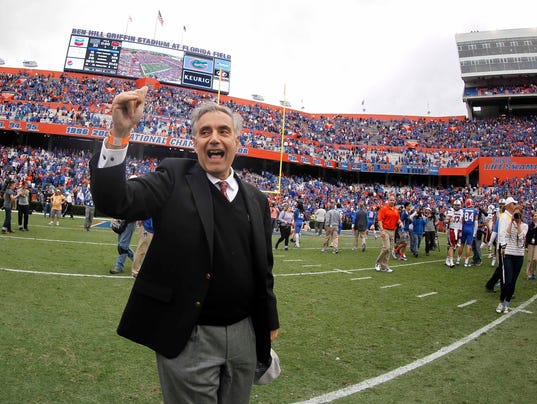NCAA increases value of scholarships in historic vote
FORT WASHINGTON, Md.— In landmark action for major-college sports, schools and athlete representatives from the NCAA's five wealthiest conferences on Saturday voted 79-1 to expand what Division I schools can provide under an athletic scholarship.
The vote, taken during the NCAA's annual convention, redefines an athletic scholarship so that it can cover not only the traditional tuition, room, board, books and fees, but also the incidental costs of attending college. That means a scholarship will now be able to pay for items including transportation and miscellaneous personal expenses.
The change occurred under new governance setup that allows the Atlantic Coast, Big 12, Big Ten, Pacific-12 and Southeastern conferences greater autonomy in rules making. The vote by the 65 schools and 15 athlete representatives -- three from each of the five conferences – allows, but does not require, all Division I schools to award these so-called cost-of-attendance scholarships in all sports.
In addition to the scholarship change, the schools and athlete reps voted to:
---Allow athletes to borrow against future earnings to purchase so-called loss-of-value insurance – policies that can help athletes if an injury while playing college sports results in an athlete getting less money from a professional contract than they might have otherwise gotten.
--Approve legislation that will prevent schools and coaches from choosing not to renew an athlete's scholarship for athletic reasons. Under the system that has been in place, most athletic scholarships are subject to annual renewal.
--Approve a resolution under which they pledge to, within the next two years, approve rules changes that would regulate time demands on athletes "to ensure an appropriate balance between athletics participation and the academic obligations and opportunities presented to students generally." Other changes to be addressed include those related to athletes' access to career-related insurance and interaction with agents.
The new rules take effect Aug. 1, 2015, but scholarship agreements for the 2015-16 school year can be executed prior to that date.
The decision to increase the value of scholarships comes after years of discussion within the association which included concerns over how programs would fund them.
In an interview with USA TODAY Sports prior to the start of the convention, University of South Carolina president Harris Pastides said he was looking forward to a meeting that would be "an active one, even historic."
"I think it's an opportunity to, if I may say, re-plant the flag and say that the NCAA is an organization of universities that know what they're doing and can come together even with diverse perspectives and do what's right for student-athletes," added Pastides, who on Sunday was selected to become chairman of the Division I Board of Directors.
"I think other years and in other places maybe the conventions were more about tinkering with policy and/or changing a rule here or there – and we will do that, as well. But I think this one is about kind of re-planting the flag and saying, 'We're the trusted organization in charge of college athletics.' "
Saturday's vote follows several recent moves to improve conditions for major-college athletes. In April 2014, the NCAA approved unlimited meals and snacks for Division I athletes.
A little less than two weeks ago, just before the new College Football Playoff championship game, the CFP and the NCAA announced that they will provide financial assistance to cover travel expenses for the families of athletes participating in the 2015 CFP title game and the 2015 Final Fours of the NCAA Division I men's and women's basketball tournaments. (NCAA President Mark Emmert said here earlier this week that the future of those two "pilot programs" will be up to the member schools.)
The moves also come about five months after a federal district judge ruled against the NCAA in a lawsuit that challenged the NCAA's limits on what Bowl Subdivision football and Division I men's basketball players can receive for playing sports and for the use of the names, images and likenesses in in live television broadcasts, rebroadcasts of games and video games. In a ruling that the NCAA has appealed to the 9th U.S. Circuit Court of Appeals, Judge Claudia Wilken said that the NCAA's current scholarship rules "unreasonably restrain trade" in violation of antitrust laws. In her ruling, injunction and a subsequent interpretation of the injunction, she said the NCAA will be able to cap the amount of new compensation that the football and men's basketball players can receive while they are in school, but that cap will not be allowed to be an amount that is less than the athletes' cost of attending school.
Wilken also decided to allow schools and conferences to deposit money in trust for football and men's basketball players that will become payable when they leave school or their eligibility expires.

Replies